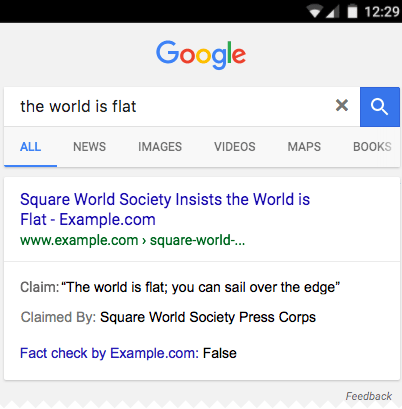Seems like someone else got tired of fake news, and we should’ve guessed that it had to be Google.
Obviously. It is the internet, afterall. Anything that goes up there is information or news.
Can you now imagine a world where celebrity death hoaxes will finally come to an end?!
However, this is not the reason why Google must have decided to come up with this feature. It is postulated that Google faced severe backlash after it showed a neo-Nazi website as the top result on searching for Holocaust. Oh, the irony!
Apparently tired of all this jumla, Google decided to introduce some rationality in the circulation of such news.

Why this policy?
Google has always followed a protocol of rectifying fake information or fake news from its website since January, and it has already banned 200 publishers in two months. Now, after the neo-Nazi incident, Google decided to pull up its socks against fake online content.
The giant believes that this will help the reader make a more informed judgment on any issue, besides sweeping away false news on the internet.
Read: These Google Hacks Will Definitely Prove To Be Your Time-Pass
How does it operate?
If you think Google will be doing the fact-checking itself, halt there!
The site is relying heavily on unbiased fact-checking websites like Politifact and Snopes (along with 148 others) to asses the statements made by public officials and news organisations.
So, whenever you type any search query, for example, 27 million people trapped in modern slavery, Google itself will generate results from these two websites. It will tell you whether the claim is true or not, and if it is true, it will give you a brief supplementary information – who it was coined by and when.

It is still not clear how Google will carry out these search results, but however it does, this can prove very effective.
Are there any negatives to it?
Many.
1. This kind of censorship can be detrimental to independent reports that are sometimes not recorded as “authentic”. The facts that are put forth by many independent are often dismissed, and this fact checking will make the dismissal even easier.
2. Not all history in the world has always been recorded. History has always been unfair and facts can always me molded to suit one’s own purpose. Google’s claim to allow an absolutely sanitized atmosphere does not hold water.
3. This will limit the provision of news only to a few organisations.
4. There can be a situation in which numerous fact checkers might come to different conclusions. With Google being objective in its policy, it would become extremely difficult to allow one fact to surface, and deem one information as the truth.
While Google’s step is commendable, there are some things Google needs to keep in mind while implementing it. This commendable idea has quite a number of loopholes. But if they are effectively fixed, we can probably tackle one of the gravest problems of the Information Age.
Other Recommendations:
http://edtimes.in/2011/09/google-vs-samsung-vs-apple/
http://edtimes.in/2017/04/youtube-go-for-the-indian-audience-finally-on-google-play-store-in-beta-version/





































